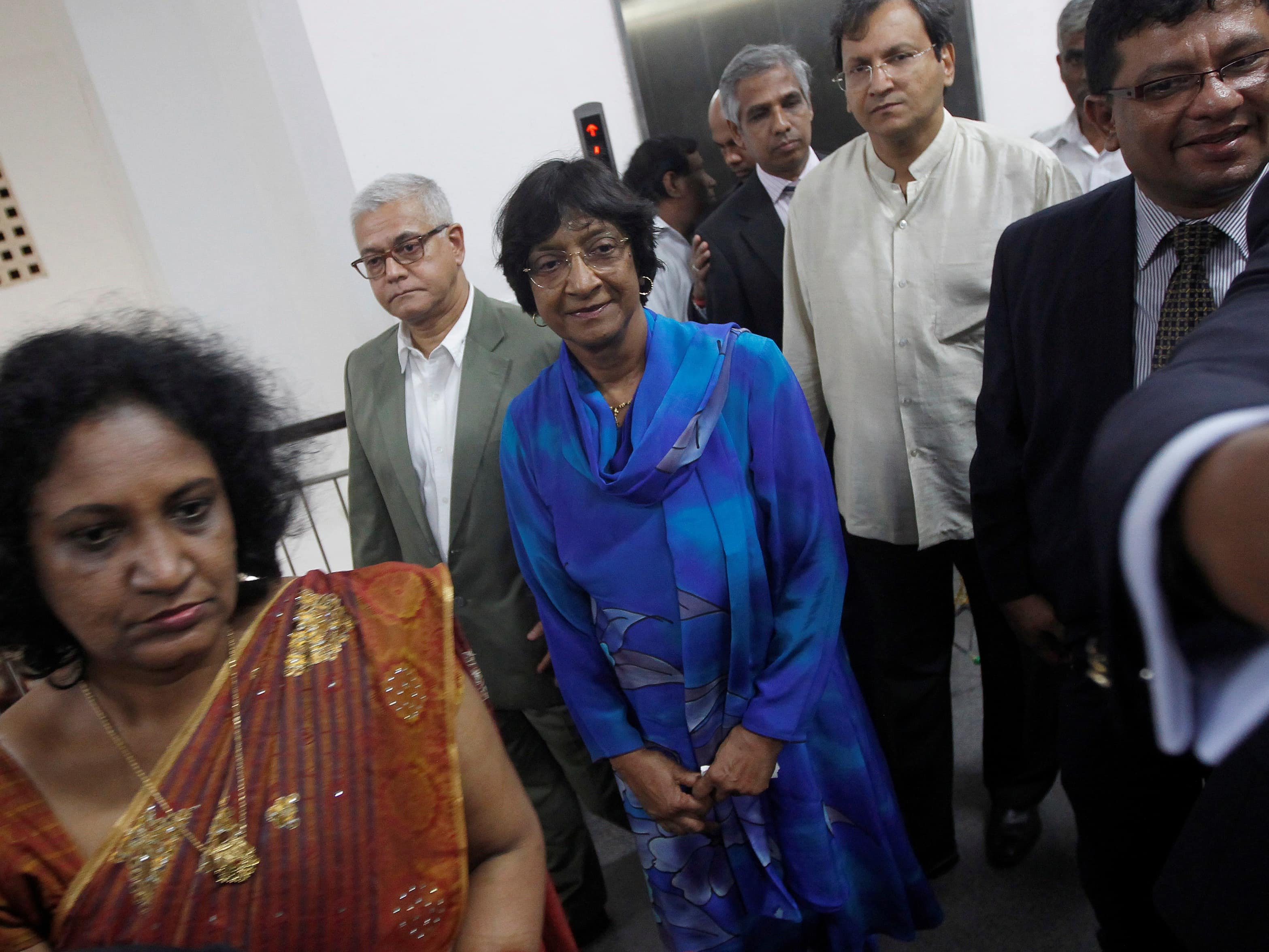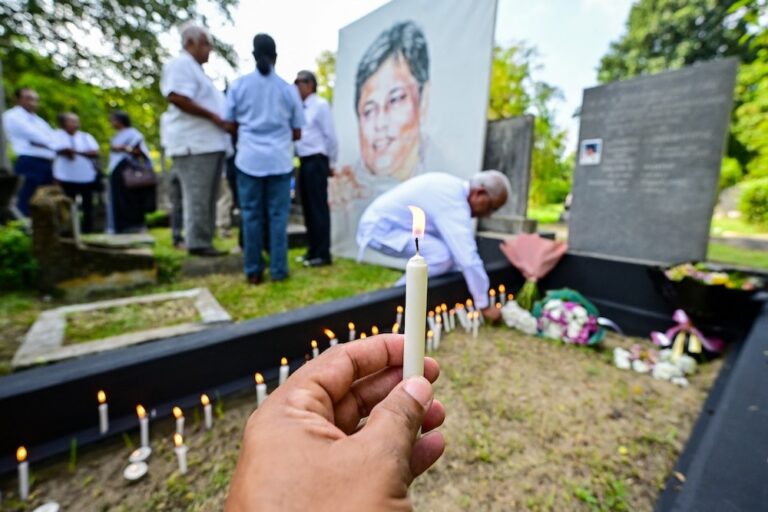Though Sri Lanka guarantees the right to free speech in its constitution and is a signatory to all relevant international covenants, seven media organisations informed a UN delegation visiting the country that these rights have been under severe threat since the last many years.
On 29 August 2013, journalists in Sri Lanka, represented by a coalition of seven different organisations, met with the delegation of the United Nations High Commissioner for Human Rights, Navaneetham “Navi” Pillay, now midway through a week-long visit to the country.
Pillay and her delegation are seeking a first-hand assessment of the climate for human rights and national reconciliation, well over four years since Sri Lanka’s quarter-century long civil war was declared over.
The seven journalists’ organisations made a strong case for foregrounding media freedom, the right to free speech and the right to information among the priority areas in post-war Sri Lanka.
Though Sri Lanka guarantees the right to free speech in its constitution and is a signatory to all relevant international covenants, the seven media organisations informed the U.N. delegation, these rights have been under severe threat since the last many years.
The threats faced which have been highlighted in various public statements by Sri Lanka’s journalists over the years, include killings and disappearances, physical attacks, verbal intimidation and threats of reprisals, and the constant danger of police action. Much of the hostile rhetoric which is often the precursor to acts of physical violence, is known to originate with official spokespersons speaking through state-owned media.
The memorandum submitted to the U.N. delegation speaks of one hundred and fourteen media practitioners and other citizens being killed since 1981, in retaliation for their exercise of the right to free speech. The trend has in fact been escalating, with thirty-four journalists being recorded killed since 2005.
There have been several cases of journalists being arrested, charged with criminal offences, including terrorism, and prosecuted under harsh emergency regulations in force during the country’s civil war. A number of media establishments have been targeted with arson attacks, and political figures have been known to often put themselves in the vanguard of mobs wreaking violence against journalists and the media.
Under these pressures, media employers have often been known to subject journalists to unreasonable demands, often removing those among them that are active in press freedom campaigns from their jobs, suspending them or sending them on compulsory leave.
In recent years, the Government has through loyal elements in the business domain, been seeking to directly control media organisations by buying them up, or conferring some undue privileges on them. A number of websites publishing critical political commentary have been blocked and their staff violently attacked on occasion.
With all this, the reign of impunity continues. A specific recommendation by the Lessons Learnt and Reconciliation Commission – appointed by the Sri Lankan president after the end of the war – that credible investigations should be carried out into all acts of violence against journalists, remains unimplemented.
With the climate of intimidation being pervasive, Sri Lanka’s journalists are compelled to adopt the survival strategies of exile or severe self-censorship.
Sri Lanka’s journalists have urged the U.N. delegation to strongly recommend that the Sri Lankan government implement a series of steps to improve the climate for free speech in the country, including ending hostile rhetoric against journalists and the media, the enactment of a right to information law, and ensuring accountability for all past violations.
The organisations that signed the petition and were represented at the meeting with the U.N. delegation were the Free Media Movement of Sri Lanka (FMM), the Sri Lanka Working Journalists Association (SLWJA), the Federation of Media Employees Trade Union (FMETU), Sri Lanka Tamil Media Alliance (SLTMA), Sri Lanka Muslim Media Forum (SLMMF), South Asian Free Media Association – Sri Lanka Chapter (SAFMA) and Media Movement for Democracy (MMD). The full text of the memorandum submitted and further details on the discussions, could be obtained through Sunil Jayasekera (FMM) at +94-77-7751092 (sunil.jayasekara@gmail.com) or Dharmasiri Lankapeli (FMETU) at +94-77-3641111 (dlankapeli@gmail.com).
Armed home invasion of Sri Lankan journalist couple
In a statement on August 27, the International Federation of Journalists (IFJ) joined partners and affiliates, the FMM and the SLWJA in strongly condemning the armed home invasion inflicted on a journalist couple in Colombo just before dawn on August 24.
FMM and SLWJA reported that a group of masked men, armed with knives and what seemed to be hand grenades, forced their way into the home of Mandana Ismail Abeywickrema and Romesh Abeywickrema. The men ransacked the house, took away valuable items including jewelry and, curiously, closely examined files and documents belonging to the couple.
Mandana is associate editor of the Sunday Leader, and her husband Romesh is business editor of the same newspaper.
After being tipped off by the couple, police reportedly challenged the intruders as they were leaving the home, shooting one intruder dead and capturing another two.
Police have described the incident as armed robbery, but FMM convenor Sunil Jayasekara has suggested the interest shown by the intruders in the couple’s documents, indicated another motive.
A few days before the armed intrusion the tyres of the Abeywickrema family vehicle were slashed and the body of a dead cat dumped on their door step. And just prior to these events, a newspaper known for pro-government sympathies had been attacking Mandana Ismail, describing her as “unpatriotic”.
The IFJ Asia-Pacific said: “We are deeply concerned at these events which bear an eerie resemblance to past incidents of personal vilification against journalists culminating in a physical attack.
“We call upon Sri Lanka’s Ministry of Information to urge restraint among the staff of state-owned media outlets and for them to cease the campaigns of attack and vilification against independent, public-spirited journalists”.
“Further, we call on the police to determine the genuine motives behind the attack and prosecute those responsible,” the IFJ said.



